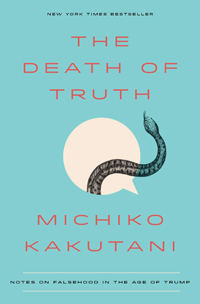 Michiko Kakutani, The Death of Truth: Notes on Falsehood in the Age of Trump (New York: Tim Duggan Books, 2018), 208pp.
Michiko Kakutani, The Death of Truth: Notes on Falsehood in the Age of Trump (New York: Tim Duggan Books, 2018), 208pp.
On November 9, 1989, the head of the East German Communist Party announced that citizens of the GDR could cross the border whenever they pleased. And so they did. Others hammered away at the wall that night. The fall of the Berlin Wall was a euphoric and iconic moment that symbolized the end of the Cold War. Just two years later, in 1991, the Soviet Union fell. It felt like the triumph of the West.
The historian Francis Fukuyama wrote an essay in 1989 called "The End of History?" He argued that liberal democracy had triumphed and would become "the final form of government." Thirty years later, today that view feels painfully naive. Fukuyama has retracted his views, saying that back then he "didn't have a sense or a theory about how democracies can go backward," but that today he now understands that "they clearly can."
We now know that democracies can die. That progress is not automatic or inevitable. That the United States is not immune from historical forces that have eroded and even destroyed democracies. For Michiko Kakutani, for many years the chief book critic of the New York Times and a winner of the Pulitzer Prize (1998), the death of truth and the rise of falsehood go a long way toward explaining the threats posed to American democracy.
In some ways Kakutani explores familiar territory, like fake news, the power of the internet, political partisanship, alt-Right groups, conspiracy theories, disdain for experts and expertise, postmodern subjectivity, and, no big surprise, an American president who is a prolific liar. But what really caught my attention is a theme that she returns to again and again: that today we are losing a sense of shared reality. We are "increasingly segregated in terms of politics, culture, geography, and lifestyle." She quotes Obama, who worried that Americans are "operating in completely different information systems."
Another way to state this, as she does in her last few pages, is that we have increasingly lost a sense of our civic common good. She ends her book by appealing to Washington and Jefferson to that end. A shared sense of reality. Common concerns that bind us together. Important causes about which we all can and should agree. For more on this theme see my reviews of Robert B. Reich, The Common Good (New York: Knopf, 2018); Miroslav Volf, A Public Faith; How Followers of Christ Should Serve the Common Good (Grand Rapids: Brazos Press, 2011); and Mark Lilla, The Once and Future Liberal; After Identity Politics (New York: Harper, 2017), along with my Conversation Interview with Lilla called "Our Common Good."
Dan Clendenin: dan@journeywithjesus.net


